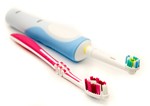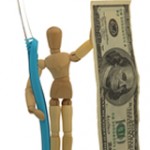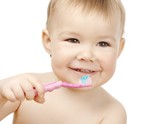 You want your smile to look great and stay healthy, which requires some effort on your part. Properly caring for your teeth and gums promotes good oral health. One important component of home care is getting the right toothbrush and keeping it in good shape.
You want your smile to look great and stay healthy, which requires some effort on your part. Properly caring for your teeth and gums promotes good oral health. One important component of home care is getting the right toothbrush and keeping it in good shape.
When you buy a toothbrush, make sure to find one with soft bristles. Brushing should clean teeth without damaging the surfaces or gums, so most dentist recommend soft bristled brushes. Whether you choose a manual or electric toothbrush is less important than choosing a brush you will use on a regular basis.
Generally, you need to replace your toothbrush every three months. Over time the bristles break or become frayed, causing them to lose their effectiveness. If you catch a cold or develop an infection in your mouth, throw out the brush immediately and replace it with a new one to prevent re-infection.
Once you have cleaned your teeth, remember to take care of your toothbrush. If food particles aren’t rinsed away, bacteria can grow on your teeth, even if you aren’t sick. Inspect your brush to make sure nothing is stuck between the bristles and completely rinse it out; then, allow the toothbrush to air dry over night. Placing it in a drawer or covering it with a case seals in the moisture and promotes bacteria growth.
To prevent the spreading of germs, make sure you don’t store your toothbrush wear it can touch another brush. As far as toothbrush etiquette goes, you should never share your brush with another person. If you have any doubts about contamination, be safe and throw the brush out.
Schedule a visit with our Family and Cosmetic Dental practice in Napa, CA. – Rolinda Harsany DDS
 With little improvement in the economy, reduced wages, job loss, and health care costs on the rise, people are cutting expenses wherever they can. Often, people start by forging dental appointments. Other times, dental visits are seen as optional and fall off the list of priorities. Before you cancel your next appointment, think about the importance of dental care:
With little improvement in the economy, reduced wages, job loss, and health care costs on the rise, people are cutting expenses wherever they can. Often, people start by forging dental appointments. Other times, dental visits are seen as optional and fall off the list of priorities. Before you cancel your next appointment, think about the importance of dental care:
• You can save time and money. Everyone has heard the old adage, “An ounce of prevention is worth a pound of cure.” Keeping regular checkups on the calendar allows your dentist to monitor your oral health and catch a small problem, such as a cavity, before it turns into a larger issue, like a root canal.
• Dental visits can improve your appearance. If you want to maintain a vibrant smile, regular appointments can help. A professional cleaning and polishing will remove build up, allowing your smile to really sparkle.
• Routine checkups keep your oral health in good shape. Gum disease, tooth decay, and TMD can compromise your dental health. Without treatment, these issues can wreak havoc on your mouth and cause serious damage. At your regular appointment, your dentist will discuss options to address any problems and protect your smile long-term.
• Your dentist can detect other health problems. In many cases, your mouth shows signs of overall health issues. For example, X-rays of your teeth can indicate the development of osteoporosis, a condition that causes weakening and brittleness in bones.
It’s time to schedule a visit to our Family and Cosmetic Dental practice in Napa, CA. – Rolinda Harsany DDS
Expectant mothers get lots of advice while they are pregnant. Well-meaning friends may tell you to get plenty of rest, avoid alcohol, and take prenatal vitamins. One area that frequently gets overlooked is dental care. Paying attention to your teeth during pregnancy can have an impact on your wellbeing as well as on the health of your unborn child. The following tips can help you maintain a vibrant smile during this special time:
• Eat a balanced diet. Not only will this ensure that the baby gets the proper nutrients, but choosing fruits, vegetables, and low-fat dairy options will also make your teeth less susceptible to tooth decay.
• Keep up home health habits. Make sure to brush at least twice a day and floss regularly. If you have morning sickness and are frequently vomiting, rinse your mouth out if you can’t brush to remove the acids from your teeth.
• Schedule regular dental checkups. Although you should avoid x-rays and optional cosmetic work during pregnancy, visit your dentist for a routine exam and cleaning. This appointment will give your practitioner a chance to monitor your oral health and look for any signs of pregnancy gingivitis, inflammation of the gums that occurs while you are pregnant.
• Immediately contact your dentist about any issues. If you notice bleeding while you brush or if you develop a toothache, call your dentist’s office right away. The problem won’t go away on its own, and ignoring the symptoms could make things worse for you or your baby.
Rolinda Harsany DDS Family and Cosmetic Dentistry in Napa California
 Second only to the common cold, tooth decay is one of the most prevalent conditions in this country. Starting your children on the path to lifelong oral health means teaching them the importance of taking good care of their teeth. The following tips can help you protect the health and beauty of your child’s smile:
Second only to the common cold, tooth decay is one of the most prevalent conditions in this country. Starting your children on the path to lifelong oral health means teaching them the importance of taking good care of their teeth. The following tips can help you protect the health and beauty of your child’s smile:
• Schedule a first dental visit. Many dentist recommend bringing your child in on or around the first birthday, and definitely by age three. Primary, or baby, teeth allow your child to speak clearly and chew naturally. As well, baby teeth serve as placeholders for permanent teeth, so you need to take your child to the dentist for regular checkups.
• Give up the bottle. Young children can develop early tooth decay, also called baby bottle mouth, when parents let them go to sleep with milk or juice bottles. The best plan is to wean your child of the bottle by age one, but if that isn’t possible, make sure you only fill the bottle with water before bedtime.
• Use a fluoride toothpaste. Fluoride helps young children develop strong teeth, so it’s important to start brushing with a small amount of fluoride toothpaste once most of the baby teeth have erupted.
• Encourage healthy eating. A balanced diet promotes overall health, including your teeth and gums. Limit intake of carbohydrates, sugary treats, and acidic foods, which can weaken enamel and increase the chances for cavities. Instead, offer snacks like crunchy vegetables, cheese, and yogurt, which are good for your teeth.
Your oral health is our priority at Rolinda Harsany DDS – Cosmetic and Family Dentistry in Napa, CA.
Considered the earliest form of gum disease, gingivitis is inflammation of the gums. At this stage, signs usually include redness, swelling, and slight bleeding when you brush. Gingivitis occurs because of plaque, the sticky film that constantly develops on teeth and gums.
When plaque builds ups, toxins are produced, which irritate your gums and produce gingivitis. With gum disease, pockets of infection form and your gums may pull away from your teeth. Because gingivitis is gum disease in the early stages, the damage can still be reversed. If left untreated, gingivitis can progress to periodontitis, causing permanent problems such as gum recession and even tooth loss.
Because gum disease often presents with mild symptoms initially, many people don’t realize they have a problem. Conservative estimates suggest that 80 percent of adults in the United States have some level of gum disease. Not only can gum disease wreak havoc on your mouth, but it has also been linked to more serious health issues, like heart disease, stroke, osteoporosis, and diabetes complications.
One of the ways to prevent gingivitis is good oral health care. Brushing your teeth at least twice a day and flossing regularly will remove plaque and keep teeth in top shape. Another important component of dental care is regular checkups. Routine cleaning remove tartar, hardened plaque, from your teeth. As well, these appointments allow your dentist to look for signs of trouble and address any issue before they get out of hand. Making healthy choice in your diet and avoiding tobacco use or excessive alcohol consumption will also decrease your odds of developing gingivitis or gum disease.
Schedule a visit to Rolinda Harsany DDS, Family and Cosmetic Dentistry in Napa, California.
 If you ask dentists which teeth to floss, the response is often, “only the ones you want to keep.” Combined with brushing, flossing is the most important contributor to your dental health. In fact, flossing promotes healthy gums as well as prevents tooth decay. Consider the following information about flossing if you think it’s not for you:
If you ask dentists which teeth to floss, the response is often, “only the ones you want to keep.” Combined with brushing, flossing is the most important contributor to your dental health. In fact, flossing promotes healthy gums as well as prevents tooth decay. Consider the following information about flossing if you think it’s not for you:
• When you only brush your teeth, you leave 40 percent of the germs in your mouth. It’s kind of like cleaning only 60 percent of your body.
• Research suggests that flossing may benefit overall wellbeing, including reduction in the risk of heat attack.
• Regular flossing will get the food and plaque stuck between teeth, which brushes often can’t reach. Plaque can harden into tartar, increasing the chances of developing periodontal disease and cavities. As well, flossing helps lessen the chances of developing bad breath by removing the debris from your mouth.
It takes about 30 days to create a habit, so if you don’t floss now, you can still get started.
Remember these tips:
• Plan to floss at the same time every day so you won’t forget or become distracted.
• If it seems to take too long, floss your upper teeth in the morning and lower teeth in the evening.
• When dexterity is an issue, look into a power flosser, which makes the process easier.
• As you floss, slide the string between the gums and teeth so as not to damage the tissue in your mouth.
• Completely brushing and flossing your teeth only takes about 10 minutes, but these steps can dramatically improve your dental health.
Let us give you something to smile about at Rolinda Harsany DDS – Cosmetic and Family Dentistry in Napa, CA.
 You want your smile to look great and stay healthy, which requires some effort on your part. Properly caring for your teeth and gums promotes good oral health. One important component of home care is getting the right toothbrush and keeping it in good shape.
You want your smile to look great and stay healthy, which requires some effort on your part. Properly caring for your teeth and gums promotes good oral health. One important component of home care is getting the right toothbrush and keeping it in good shape.




